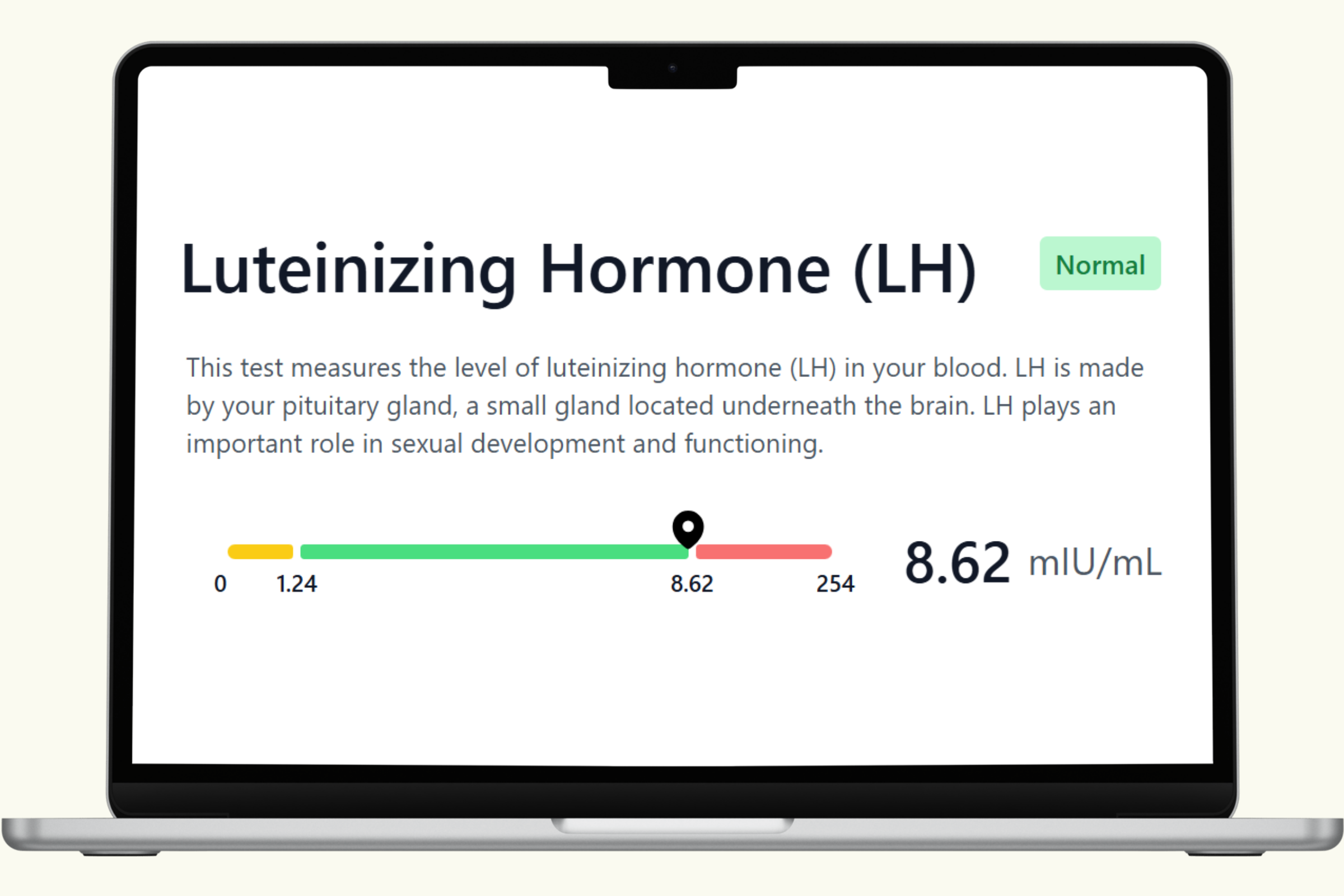Luteinizing Hormone (LH) Blood Test: A Key Marker of Male Hormonal Balance
The Luteinizing Hormone (LH) Blood Test, part of the PlexusDx Men’s Hormone Blood Test, measures levels of LH, a hormone produced by the pituitary gland. In men, LH plays a critical role in reproductive health by signaling the testes to produce testosterone, which is essential for sperm production, fertility, libido, and overall hormonal balance.
What is Luteinizing Hormone (LH)?
LH is a messenger hormone released by the pituitary gland under the control of the hypothalamus and the body’s sex hormone feedback loop. When testosterone levels are low, the hypothalamus signals the pituitary to release LH, which stimulates the Leydig cells in the testes to produce more testosterone. Conversely, when testosterone levels rise, LH production decreases to maintain balance.
Why the LH Test is Important for Men
The LH Blood Test provides valuable insight into male reproductive and hormonal health. While total and free testosterone levels are often measured to evaluate hormone balance, LH helps reveal whether problems originate in the testes, pituitary gland, or hypothalamus. This distinction is crucial for accurate diagnosis and treatment planning.
Doctors may recommend an LH test when men experience symptoms such as:
- Low testosterone symptoms: Fatigue, low libido, erectile dysfunction, and mood changes.
- Infertility: Difficulty conceiving may indicate low sperm production caused by low LH or impaired testicular function.
- Delayed or incomplete puberty: In younger men or adolescents.
- Signs of pituitary or hypothalamic disorders: Headaches, vision problems, or multiple hormone deficiencies.
Reference and Functional Ranges
Normal LH levels can vary slightly depending on the lab, but typical ranges for adult men include:
- Standard reference range: 1.7 – 8.6 IU/L
- Functional/optimal range: 3.0 – 6.0 IU/L (depending on age, symptoms, and testosterone status)
Results should always be interpreted alongside testosterone, free testosterone, and other hormones for the most accurate picture of reproductive health.
What LH Levels Can Reveal
- Low LH: May indicate pituitary or hypothalamic dysfunction (secondary hypogonadism), where the signaling to the testes is impaired.
- High LH: May indicate testicular failure (primary hypogonadism), where the testes do not respond to LH despite proper signaling, leading to reduced testosterone and impaired fertility.
Because LH is tightly linked to testosterone production, measuring both together provides greater diagnostic clarity.
Factors That Influence LH
Several factors can affect LH production and results:
- Age: LH levels may rise with age as testosterone production naturally declines.
- Stress: Chronic stress and elevated cortisol may disrupt hypothalamic signaling.
- Body composition: Obesity and insulin resistance can influence hormone regulation.
- Medical conditions: Pituitary tumors, hypothalamic disorders, or testicular damage may cause abnormal LH results.
- Medications: Steroid use, opioid therapy, or certain hormonal treatments can alter LH levels.
How the Test Works
The PlexusDx LH Blood Test uses an at-home dried blood spot collection method with an ADX card. This simple, minimally invasive process allows you to collect your sample from home without the need for a traditional blood draw. After mailing your sample to the lab, results are processed and delivered securely online.
Interpreting LH Alongside Other Hormones
Because LH works in close coordination with testosterone and follicle-stimulating hormone (FSH), it is often measured as part of a comprehensive hormone panel. Together, these biomarkers provide detailed insight into:
- Testicular function and sperm production
- Pituitary and hypothalamic health
- Causes of infertility or low testosterone symptoms
Key Takeaways
- The LH Blood Test measures a pituitary hormone that signals the testes to produce testosterone.
- It is an essential marker for male reproductive health, fertility, and hormonal balance.
- Low LH suggests pituitary or hypothalamic dysfunction; high LH suggests testicular failure.
- Testing LH alongside testosterone, free testosterone, and FSH provides a complete picture of male hormone health.
- PlexusDx makes testing simple with at-home dried blood spot collection and secure online results.
Final Thoughts
The Luteinizing Hormone (LH) Blood Test is a cornerstone of men’s reproductive and hormonal health assessment. By clarifying how the brain and testes communicate to regulate testosterone production, LH testing helps identify the root causes of low testosterone, infertility, or pituitary disorders. With the convenience of at-home testing, PlexusDx empowers men to take control of their hormonal health and gain the insights needed to improve energy, vitality, and fertility.

Share:
Free Testosterone Blood Test
Estradiol (E2) Blood Test